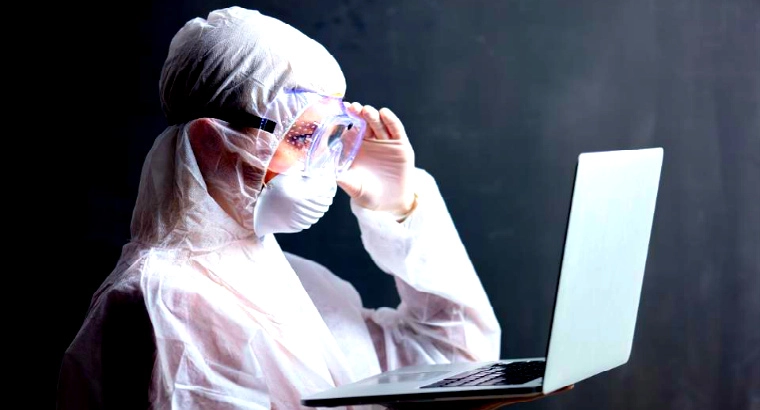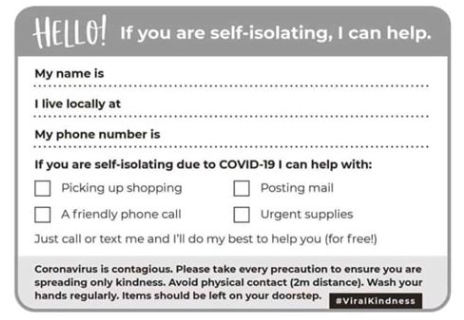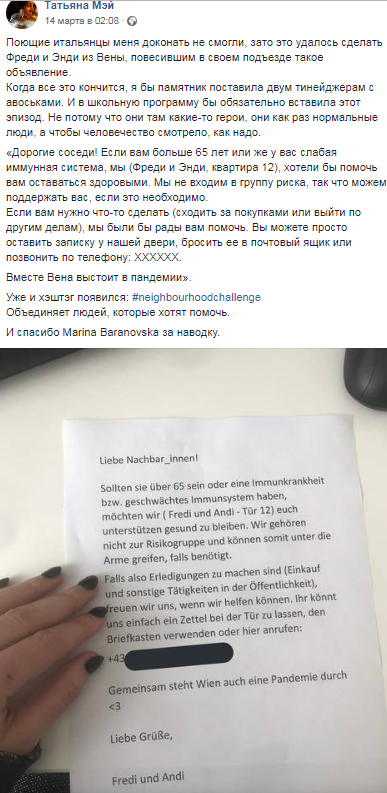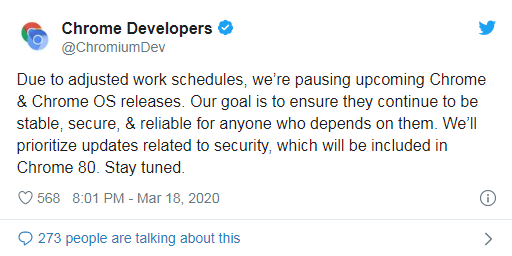
The pandemic of the new coronavirus COVID-19 that has flared up in different parts of the world has brought unexpected changes into the lives of many people, but somewhere on the contrary - expected changes. For example, in connection with the announcement of quarantine in many countries, employees of many companies have to switch to a remote way of working, which affected the work of the Internet. In addition to the impact on the quality of the Internet, changes have taken place in the work of social networks that have entered the battle with fakes and engaged in informing the population, as well as streaming and other services. The authorities of different countries are now paying much more attention to the trends occurring on the Internet (both in negative and positive senses), many laws are being adopted that regulate the Internet,
A commendable trend is the self-organization of Internet users who have volunteered to help older people. They unite through social networks, conduct educational work, deliver food and medicine.


At the same time, all sorts of personalities have revived, ready to make a name for themselves or to improve their financial situation "on the HYIP". A lot of fake recommendations related to the epidemic have emerged. These fakes are spread through social networks and emails. In addition, a real tsunami of unreliable news is roaming the Internet, spreading panic, doubts about the correctness of the actions of doctors, etc.
US companies Facebook, Google and Microsoft, as well as LinkedIn, Reddit, Twitter and YouTube, said in a joint statement that they are working together to counter misinformation about a new type of coronavirus.
“We are working closely on COVID-19 response efforts. We help millions of people stay connected, and we work together to combat fraud and misinformation about the virus, distribute credible content on our platforms and share critical updates in coordination with government health agencies around the world, ”the Facebook post said.
The companies urged other firms to do the same, noting that they are working to "keep communities healthy and safe."
Twitter announced its intention to ban messages about COVID-19 if they carry false information and can harm people. In this regard, the company is once again reviewing its policies, and will now ask users to remove posts that increase the risk of coronavirus infection. These publications include:
- Posts denying guides prepared by experts;
- Tweets encouraging the use of fake or ineffective treatments, prevention and diagnosis;
- Misleading information allegedly from trusted sources;
- Information about COVID-19, designed to coerce users into certain actions beneficial to the disseminator of information (for example, statements like "the danger of coronavirus is greatly exaggerated, go and support the local bar" or "the need to wash your hands is propaganda from soap manufacturers, stop washing your hands") ;
- Unverified information designed to spread panic and cause widespread anxiety (for example, "the government canceled food supplies for 2 months, run to the store and buy everything").
A list of all tweets that will be banned on Twitter can be found on the official blog of the company.
Due to the quarantine, the technology giants are experiencing disruptions in the work of content technology giants. Since some of the employees were sent to work remotely from home by large social networks, they have to use artificial intelligence (AI) more often to search for illegal and unethical content.
YouTube, Twitter and Facebook have such systems. Companies admit that AI is not perfect yet and sometimes makes mistakes. However, due to the extremely high volume of information that passes through these platforms on a daily basis, as well as due to the changes in the work of companies caused by the epidemic, they cannot refuse it.
The situation is complicated by the fact that in connection with the spread of the coronavirus, more and more messages on medical and near-medical topics appear on the network, which mislead users. Companies try to remove false messages or mark them as questionable. But sometimes it happens that artificial intelligence takes messages for fakes that are not false.
Companies have no choice but to warn users that their messages, videos, pictures and other content may be mistakenly deleted, but the feedback will work, although the requests will have to be considered longer than usual.
Apparently, this will also be the reason for further work on improving AI, and in this case, the global pandemic may give impetus to the development of many technologies, no matter how terrible it sounds.
For example, in March, British experts DeepMind posted in open access by artificial intelligence "predictions" about protein structures associated with the coronavirus. The data, which has yet to be verified in the laboratory, was obtained using a new deep learning system.
As the researchers note, understanding protein structure is an important step towards defeating the pandemic. Scientists skipped the stage of publishing scientific work in specialized publications and immediately posted the results of the algorithms to the network. This was done in order not to waste time in the midst of the epidemic.

But some technologies can work both for the good and carry a rather dubious "benefit". For example, face recognition systems received an impetus in development, the use of which is practically not controlled by anyone. In China, where the pandemic began, technologies have been developed (still at the initial stage) with the help of which you can recognize a person, even if he is wearing a mask, and in Moscow such systems have recently been used to search for people who have violated quarantine.
On the one hand, these technologies can recognize potential carriers of viruses, on the other hand, they grossly interfere with the privacy of ordinary users, are not regulated by any legislation, and besides, they can still make mistakes.
Israel is going to use smartphone geolocation data to monitor people in the country. Thus, the country will be able to notify those who were close to people who are infected with the COVID-19 virus and send them to quarantine, writes the Telegram-channel "Information to Danger":
“The details of the monitoring are unknown, but, apparently, we are talking about the fact that mobile companies, which have information about the location of subscribers through cellular stations, will report it to the relevant authorities. Civil liberties organizations are sounding the alarm that this is a very dangerous precedent. Certain radical measures in such emergencies are necessary and even, perhaps, justified. The danger is that these measures do not become permanent, therefore such changes in emergency situations must necessarily include a date of termination. Otherwise, it becomes the new norm. "

The video services Youtube and Netflix will have to lower the quality of the broadcast in the videos that are watched by EU users. This is due to the inevitable network congestion, as millions of Europeans in countries where the coronavirus is actively spreading are switching to remote work and watching more videos. The default resolution in Youtube will be (720 by 576 pixels). Netflix will cut traffic by about 25%, and this measure will be in effect for 30 days.
AliExpress Russia will start removing ads on its platform for speculating on protecting people from the coronavirus. This was stated in the press service of the company, which unites the online marketplaces AliExpress, Tmall and Pandao. You can now complain about advertisements for the sale of medical masks at inflated prices directly to the support service.
AliExpress Russia has made requests to sellers:
- not to raise prices for medical and antiviral goods and other protective goods,
- not to understate prices without limiting the number of goods in the order in order to prevent the abuse of resellers.
In addition, topical actions like a medical mask as a gift for increasing the cost of an order were banned. The description of goods as having "miraculous" anti-coronavirus properties is also discouraged.
The press service of the company emphasized that the current situation on the market for protective and antiviral goods can be compared with the hike in taxi prices after the terrorist attacks, and this behavior can only cause condemnation. AliExpress has called on other companies to unite against such unethical behavior and to ensure that the prices of high-demand goods are normal.
In addition, it became known that AliExpress Russia will zero the commission for Russian sellers who register on the site after March 31. Russia will become the first country where AliExpress has a presence to take such measures.
Due to the quarantine, offline conferences, presentations, new movie launches, etc. are canceled all over the world.
But some things have to be suspended online. The Google team announced that it has suspended the release of updates for the Chrome browser and the Chrome OS operating system. Now the goal of the developers is to maintain the stability, security and reliability of the use of the software. Also, the creators of Chrome have warned that they will prioritize security-related updates.

In Russia, the Ministry of Digital Affairs postponed routine testing of the integrity and stability of the functioning of the Internet in Russia due to measures to combat the spread of coronavirus. On March 20, it was planned to work out blocking traffic encrypted using DNS technologies over HTTPS and TLS.
In 2020, the exercises were going to be held once a quarter. The next ones should take place on June 20, September 20 and December 20. The first time they passed on December 23, 2019, then they tested the security of cellular subscribers (protection of personal data, the ability to intercept their traffic, SMS and geolocation) and checked the situation with the risks and vulnerabilities of smart devices, including those used at critical infrastructure facilities.
The department promised that the threats will be worked out only on dedicated segments, stands, test sites and this will not affect the work of the Internet for ordinary users. In February, telecom operators in the Urals participating in testing systems for filtering traffic (DPI, Deep Packet Inspection) reported network failures.
The American company Apple has limited the online sale of iPhones to two smartphones per hand amid the coronavirus outbreak.
Sales restrictions have been introduced in a number of countries, including the United States and China.
After checking in the company's online store, we found out that the drop-down menu prevents buying more than two identical iPhone models.
The company's Russian website also does not allow buying more than two identical iPhones.
Due to the coronavirus pandemic and quarantine measures, many employees of offices in Moscow and the regions have been temporarily transferred to remote work. Naturally, the load on the networks and the number of new home Internet connections have increased dramatically. This information was confirmed to the journalists of Vedomosti and a number of Moscow operators.
For example, MTS reported that 20% more subscribers were connected Monday through Thursday this week than the average full-time week in February or early March. Representatives of Rostelecom and Vimpelcom announced an increase in the number of connections by 24%. There is also a surge in the regions: on average across the country, according to VimpelCom, 17% more contracts were concluded than usual - mainly in residential areas. This is also due to the fact that some enterprises reimburse their employees for connection costs.
Due to the increased number of new connections, MTS employees are working in an enhanced mode. According to TMT Consulting, at the end of 2019, there were just over 4 million home broadband Internet users in Moscow. The increase in relation to 2018 was only about 0.4%: the Moscow Internet access market is oversaturated, and there is practically no place for new subscribers to take on it.
It is also reported that the load on the networks in Moscow is growing rapidly, and traffic is moving from business centers to residential areas. For example, MTS data show that since March 16, the average daily traffic on the company's wired network in Moscow has grown by 8% compared to the previous days of this year. Growth peaks during business hours, when the workload is usually reduced.
Earlier, the Internet traffic of fixed networks "left" in the morning from the sleeping areas to the business zones of Moscow, but now there are fewer and fewer office workers in their workplaces. The head of the provider Diphost Philip Kulin believes that home networks may not withstand the increased load. They are not designed to be loaded by all users at the same time.
Also in the media it was reported that the number of orders for food and other services on the Internet has increased around the world.
The porn site PornHub has provided residents of Italy with premium accounts for free after the country's authorities announced a national quarantine in connection with the spread of the coronavirus. The subscription is valid until April 3. In the message that appears when logging into PornHub from Italy, it is said that in this way the company wants to keep users at home during the quarantine.
In addition, the site will channel a portion of the March profits of its sister platform ModelHub to Italian hospitals, where models sell their erotic content.
In Italy, at the moment, one of the most frightening situations that has developed in connection with the pandemic. Therefore, the country is taking tough measures to combat the spread of infection. Quarantine has been introduced throughout Italy: schools, universities, restaurants, bars and shops are closed - except for grocery and pharmacies. People can only visit public places when needed. The Russian authorities have closed borders for Italian citizens since mid-March.
The government and telecommunications companies need to accelerate the implementation of a plan to provide Russians with free access to socially significant Internet resources. This was stated by Russian President Vladimir Putin at a meeting with members of the government, explaining the importance of the task of the spread of the coronavirus infection COVID-19, forcing many to stay at home.
“For the possibility of ordering medicines, distance learning, receiving government services, even watching domestic feature films, children's programs and so on. For those people who stayed at home with their families, this is extremely important, ”Putin said.
The head of state has already been outstripped by a number of services. So, the online cinema Premier from March 15 opened free access to content of its own production against the backdrop of mass quarantine. According to the press service of the service:
We are talking about films, series and other content created by TV channels, production companies and studios of the Gazprom-Media holding, the company said. Among them - "House arrest", "Call DiCaprio!", "Teachers", "Behappi", "Dead Lake", "Sect" and others.“We are confident that this will be a good and useful gift in the current situation, when a huge number of people are forced to be at home, and thanks to the Premier video platform, this time will pass unnoticed and become enjoyable.”
The Okko online cinema told vc.ru that they launched the Okkobro chat bot - it issues a promotional code for the Optimum subscription package for two weeks to users who are forced to stay at home due to quarantine. To do this, you need to write @OkkoBro_bot in Telegram or send the word "okkobro" to the private messages of the official group of the Okko online cinema on VKontakte, and then attach a photo confirming that you are at home.
The offer can be used by all users, the promo code can be used once.
Ivi also reported that from March 16 to April 15, 2020, new users will be offered a subscription for 1 ruble. Also, the online cinema will open up access to more free content. The Wink video service (owned by Rostelecom) said that from March 17, all customers will be provided with the opportunity to watch Russian films and TV series, as well as children's and educational content, for free.
TVzavr decided to give users a three-month subscription, the company told vc.ru. To do this, you need to register on the website and send a photo of the sick leave and full name to the address [email protected]. Kinopoisk HD also announced that by the end of April 2020 they will give a subscription to all users who do not have it.
In addition, Russia is taking a number of measures related to online commerce. For example, Putin recently signed a decree allowing the remote sale of OTC drugs.
As you can see, the pandemic has greatly affected the Internet and modern technologies around the world. This once again shows how important access to information, online services, and communication means is now for modern mankind - they really help many people to survive, as well as unite their efforts in the fight against serious problems.
